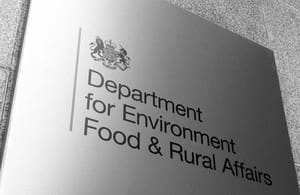 THREE new cases of Bluetongue virus BTV3 have been confirmed in the United Kingdom and authorities have warned there is a high risk of onward spread in the UK.
THREE new cases of Bluetongue virus BTV3 have been confirmed in the United Kingdom and authorities have warned there is a high risk of onward spread in the UK.
The Department for Environment, Food & Rural Affairs’ Animal and Plant Health Agency has implemented a temporary control zone around the affected farms to restrict movements of susceptible animals and their germinal products except under licence.
The UK’s deputy chief veterinary officer Dr Ele Brown confirmed the new cases on two new premises in Norfolk and Suffolk, bringing the total number of cases to four.
Dr Brown said Bluetongue does not pose a threat to human health or food safety, but the disease can impact livestock farms, and cause productivity issues.
“These are the first few cases in England where animals have shown clinical signs and been unwell from infection with bluetongue.
“These detections are a clear reminder of the threat of the disease: farmers and their vets must remain vigilant and report any suspicions to APHA,” she said.
The agency said keepers of cattle, sheep, other ruminants and camelids must remain vigilant and follow the restrictions on animal and germinal product movements that now apply in the zone. Further information on these restrictions and the licences that are available can be found here.
The agency said surveillance is underway to determine if the virus is currently circulating in the UK. Given the current temperatures and midge activity, which spread the disease, there is a high risk of onward spread in the UK, the agency said.
There have been a rising number of the cases in northern Europe and UK’s chief veterinary officer recently called for increased vigilance and responsible sourcing of livestock.
The agency said farmers should continue to monitor their animals frequently for clinical signs and report suspicion of disease immediately. They should also make sure their animals and land are registered with APHA so keepers can be kept informed and animals easily located.
UK farmers have also been reminded that free testing remains available for animals moving from the highest risk counties to live elsewhere in Great Britain or to be sold at a market within a high-risk county where there will be buyers from outside the high-risk counties.
Bluetongue virus is primarily transmitted by midge bites and affects cattle, goats, sheep, goats, deer and camelids such as llamas and alpacas. The impacts on susceptible animals can vary greatly – some show no clinical signs or effects at all while for others it can cause productivity issues such as reduced milk yield, while in the most severe cases can be fatal for infected animals.
It does not affect people, and meat and milk from infected animals are safe to eat and drink.
BTV is a notifiable disease in the UK and suspicion of BTV in animals in England must be reported to the Animal and Plant Health Agency on 03000 200 301. In Wales, suspected disease should be reported to the Animal and Plant Health Agency on 03003 038 268. In Scotland, you should contact a local field services office if Bluetongue is suspected. In Northern Ireland report can be made to the DAERA Helpline on 0300 200 7840 or by contacting the local DAERA Direct Veterinary Office. More information about bluetongue is available here.
Bluetongue in Australia
Bluetongue is also a notifiable disease in Australia and must be reported to agricultural authorities. If you suspect or can confirm that an animal is showing symptoms of one of the diseases listed below, you must report it to your local veteerinarian or your state or territory’s department of primary industries or agriculture by phoning the Emergency Animal Disease Hotline on 1800 675 888.
Agriculture Victoria said of the 26 strains BTV globally, 13 have been detected in Australia. Fortunately, the strains of BTV that can cause severe clinical disease in livestock are not present in Australia, AV said on its website.
AV said until recently, clinical disease had only been reported in Australia in 2 minor incidents involving sheep in Darwin in 1989 and 2001. Clinical disease has more recently (between 2022 and 2024) been reported in sheep in Queensland and NSW. This is the first time clinical bluetongue has been reported in commercial flocks in Australia, the agency said.

HAVE YOUR SAY